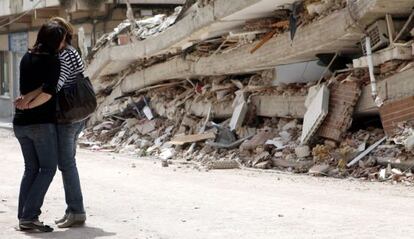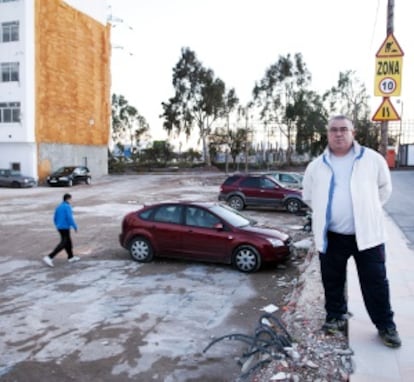The latest tremors in Lorca
It's almost two years since an earthquake toppled 1,500 homes in the Murcia town Locals are increasingly frustrated over the slow pace of reconstruction and aid


On May 11, 2011, an earthquake hit Lorca in the southeastern region of Murcia, killing nine people, including two pregnant women and a 14-year-old child. Around 1,500 homes suffered so much damage that they had to be demolished. Because this tragic earthquake affected 80 percent of the municipality, the central government, the regional government and the local council promised speedy reconstruction and ample aid, but these promises have turned out to be just empty words. Almost two years later, some 7,000 residents in Lorca remain displaced, according to an assembly of victims, which was created in the neighborhood of La Viña, the area hit hardest by the quake.
If there is one thing that everyone in this council seems to agree upon, it is the slow recovery process. "My house is nothing more than a patch of earth. How can I live this way? I'm tired of waiting and I'm tired of the despair," says Pedro Conesa, his voice breaking on the other end of the phone.
Of the 1,500 homes demolished, only 400 have been rebuilt; of the approximately 16,000 aid cases presented, around 4,000 are still to be settled. Between the central government, the Insurance Compensation Consortium and the local government, 700 million euros have been pumped into the municipality of 92,000 residents. Although the spokespersons for these three governmental groups insist that their priority is to remedy the consequences of the earthquake in Lorca, many residents feel helpless, stranded, and out of luck.
My house is nothing more than a patch of earth. How can I live this way?"
"We go from one level of importance to another. We have endless bureaucratic problems," explains Conesa. At age 52, he is unemployed and has already exhausted his unemployment benefits. With their two children, he and his wife live on 426 euros a month. The regional government has awarded him a grant to cover his rent for 24 months, but so far he has only been given four months' worth, a total of 2,200 euros.
He has also requested an advance - which he will have to pay back - from a local support group put in place by the council, after 4.2 million euros of donations were received from members of the public. During this difficult time, Conesa and his family have spent their savings. "I've worked all my life. Now I only have 1,000 euros in my account - that's two months' rent. I don't know what I'll do when that's gone," he says, clearly concerned by his plight.

To rebuild his house, the Insurance Compensation Consortium has paid Conesa 80,000 euros, an amount he is cautiously saving; he has also been granted additional aid from the central and regional governments, reaching a total of 106,000 euros, the amount needed to rebuild his home. A few weeks ago he received a letter informing him that he was the beneficiary of the grant, though he had yet to receive the check when this newspaper contacted him.
José Alberto Lario, the spokesperson for the victims association, is critical of the delay in payments to the public for both rent and reconstruction: "The regional government has requested a loan of 115 million euros from the Official Credit Institute (ICO) and 185 million euros from the European Investment Bank. That money is not here, and it's not just going to appear out of thin air."
Yolanda Muñoz, head of housing and planning at Andalusia's public works department, responds to this complaint by stressing that Lorca is her number one priority. In 2013, 60 million euros will be spent in the town, she says, adding that the promised aid is arriving. "Compensation payments from the ICO do not come through us, but rather are deposited directly into the accounts of victims in a time period of 10 to 20 days," Muñoz explains, adding that rents are being paid. "What happens is that when a resident changes his or her address, he or she must notify the organization and ensure that the check will be sent to where he or she is living. All of this takes time," she concludes.
The central government's special commissioner for the reconstruction and economic recovery of Lorca, Inmaculada García, says that "in the coming days" she will resolve the delay in rentals. "Each case has been reviewed individually. How much is being borrowed from the local support group has been calculated so that the money can be sent to credit accounts for the next four months," she says.
García, who has the status of secretary of state, is responsible for coordinating the roles of the local, regional and national government. "It's very complicated. We have to see through many different projects. If an emergency situation had been declared at the time of the earthquake, it would have been simpler. But under the subsidies law we have to stick to administrative procedures," she explains. García says that she would like to see the reconstruction process go faster; yet, she praises the "speedy" performance of the ICO, "which has already credited the accounts of Lorca residents with a total of 440 million euros."
The money is not here, and it's not just going to appear out of thin air"
More challenges arise, however, when building owners must unanimously approve a reconstruction project before it can begin. In the case of older buildings, new technologies mean old structures must be modified - in the case of the installation of an elevator in a multistory building, for example. "If you refuse, the process is stopped. Forced expropriation exists, and can be requested, but it has only been used once," says García.
The groups of residents affected by the earthquake deny that the administration has put the ball in their court: "We are not complaining out of malice - Lorca is in ruins and we feel alone," says Lario, adding that the locals have had to learn about engineering, architecture and a number of other elements of reconstruction "that aid should be taking care of."
The mayor, Francisco Jódar, admits that between 2,000 and 3,000 people have left Lorca. Forty-two-year-old Juani Garcia, her husband, and her daughter were among them. They now live in Puria, a community about 20 minutes outside Lorca. They have been denied rental assistance twice because they are not registered as residents of Lorca. "It was a precautionary move. Who could have imagined what was going to happen to us? We have presented our case, but nothing has come of it. The reality is that we are paying the mortgage on a house that has been demolished on top of our current rent of 1,500 euros a month. With this double payment, we can't make ends meet."
García is Conesa's sister-in-law. In her family, three siblings have lost their homes. They are all tired of the reconstruction that has become such an obstacle course, especially when all they can do is wait.
Tu suscripción se está usando en otro dispositivo
¿Quieres añadir otro usuario a tu suscripción?
Si continúas leyendo en este dispositivo, no se podrá leer en el otro.
FlechaTu suscripción se está usando en otro dispositivo y solo puedes acceder a EL PAÍS desde un dispositivo a la vez.
Si quieres compartir tu cuenta, cambia tu suscripción a la modalidad Premium, así podrás añadir otro usuario. Cada uno accederá con su propia cuenta de email, lo que os permitirá personalizar vuestra experiencia en EL PAÍS.
¿Tienes una suscripción de empresa? Accede aquí para contratar más cuentas.
En el caso de no saber quién está usando tu cuenta, te recomendamos cambiar tu contraseña aquí.
Si decides continuar compartiendo tu cuenta, este mensaje se mostrará en tu dispositivo y en el de la otra persona que está usando tu cuenta de forma indefinida, afectando a tu experiencia de lectura. Puedes consultar aquí los términos y condiciones de la suscripción digital.








































